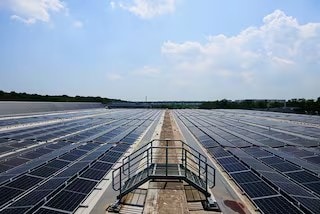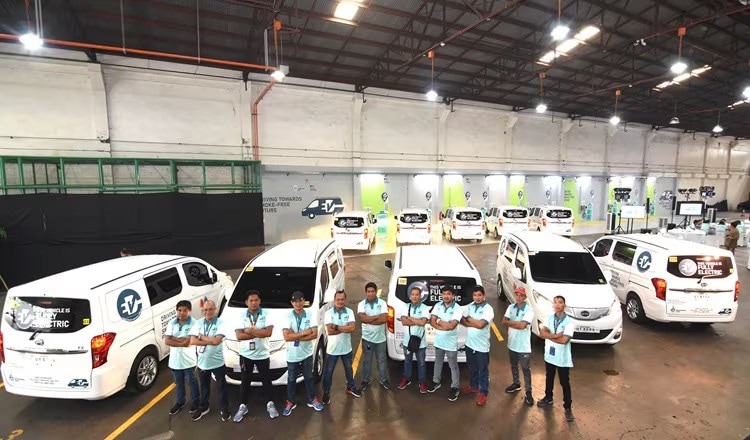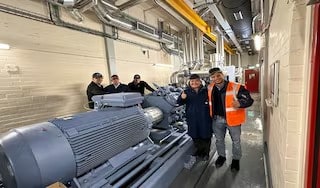Within PMI Operations, we hold direct responsibility for the majority of our climate-related IROs, and we play a pivotal role in bringing our CTP to life. Our reach spans the entire value chain, giving us a powerful platform to drive meaningful action
and safeguard our business by advancing decarbonization.
While we expect to achieve carbon neutrality in our direct operations (scope 1+2) by the end of 2025, we will continue to emphasize the energy transition through efficiency, renewable energy adoption, and the shift to a low-carbon fleet as we move toward 2030. These pillars continue to guide our efforts to reduce our direct operational footprint as we advance along our climate journey and navigate the evolving challenges ahead.
Looking toward 2030 and beyond, our primary focus now shifts to the complex challenge of decarbonizing scope 3 emissions, which account for the majority of our total carbon footprint. Much of these emissions arise from activities and sources outside of our direct control—embedded within our suppliers, logistics partners, tobacco-growing areas, and third-party manufacturers and operators—making their reduction particularly demanding. Addressing this challenge compels us to foster deep collaboration across our entire value chain, forging partnerships that can influence and inspire progress well beyond our direct reach.
Our science-based targets, including those for FLAG and Industrial emissions, guide our concrete actions. To deliver meaningful scope 3 reductions, we plan to deepen engagement with suppliers, including by expanding the power of our Sustainability Accelerator—an initiative that helps our suppliers improve sustainability in their operations. We also plan to increase our investments in nature-based solutions that can support both carbon capture and the preservation of natural ecosystems.
Last but not least, we remain committed to integrating sustainability principles into every stage of product design, seeking both incremental and transformational improvements that can reduce carbon intensity. Likewise, we will continue to drive logistics optimization to minimize transportation-related emissions.
This CTP clearly lays out our pathways for decarbonizing our operations and broader value chain, drawing on the latest science and technology as well as our evolving business needs. This updated plan also strengthens critical elements of climate adaptation, underpinned by robust efforts to integrate technological levers, stakeholder engagement, and data-driven decision-making for strong and sustainable business results.
Our focus is on building resilience while managing climate-related risks through both mitigation and adaptation measures. This integrated approach allows us to mitigate our environmental impact, adapt our operations to climate realities, and unlock new sources of value across our supply chain. This is not just about reducing our own emissions—it is about leveraging our position to catalyze broader decarbonization.
Strengthening our governance, the publication of this report coincides with the introduction of our new Environmental Policy. This policy provides concrete guidance on environmental decision-making in both our direct operations and throughout our value chain, helping to standardize our approach, prevent compliance gaps, and demonstrate to regulators, investors, and other stakeholders our commitment to meeting ambitious environmental standards. This will allow us to navigate the complex and rapidly evolving regulatory landscape while protecting long-term shareholder value and maintaining our license to operate. Importantly, the policy serves as the framework for other key PMI policies governing aspects of climate, nature, and our impact on stakeholders.
As we press forward with our climate ambition, our decarbonization levers are closely interwoven with our journey toward smoke-free business growth. We recognize, however, that the expansion of smoke-free products introduces environmental challenges—ranging from increased complexity in product design and supply chains to unique end-of life considerations. Our CTP strives to address these impacts, prompting us to remain vigilant and adaptive, and to apply innovative approaches to ensure that, as our business evolves, our actions remain effective in mitigating potential risks.
The transition requires us to think beyond traditional practices. We are building new capabilities in carbon management, investing in nature-based solutions, and reimagining how we work with communities to create shared value.
As we advance this ambitious agenda, I want to recognize the exceptional dedication of every member of our Operations team who has made sustainability an integral part of their daily work. Each of them understands that embedding climate considerations into decision-making is about future-proofing our business and ensuring PMI’s continued leadership in a rapidly evolving world.
Our commitment is clear: to use our operational leadership to drive the progress needed for a low-carbon future, proving that ambitious climate action and strong business performance can go hand in hand. Integrating sustainability into operations across our global footprint positions us not just as a company that adapts to change, but as one that shapes it. Together, we are proving that operational excellence and climate leadership are not competing priorities—they are the foundation of our long-term success.
Scott Coutts, Senior Vice President, Operations




